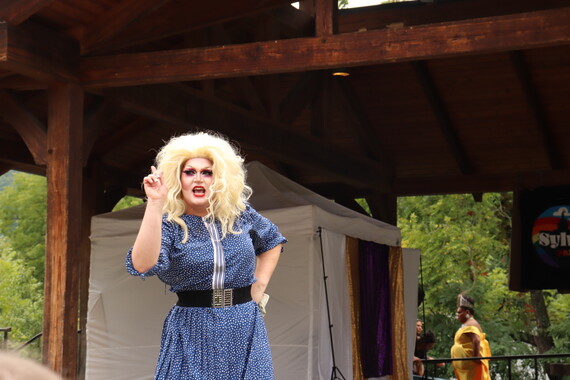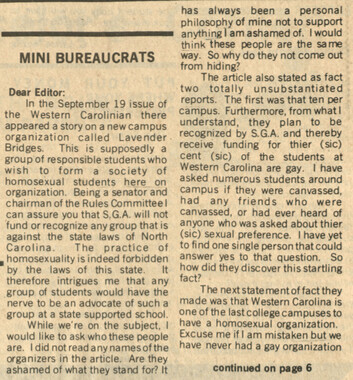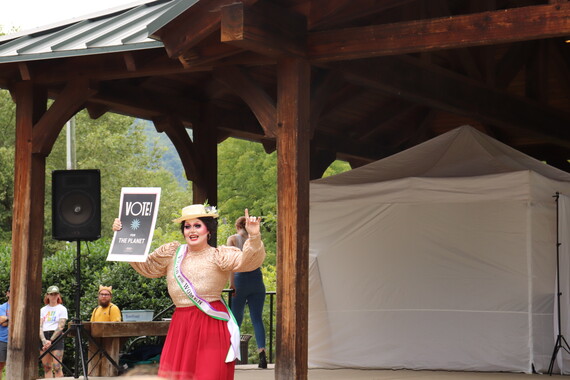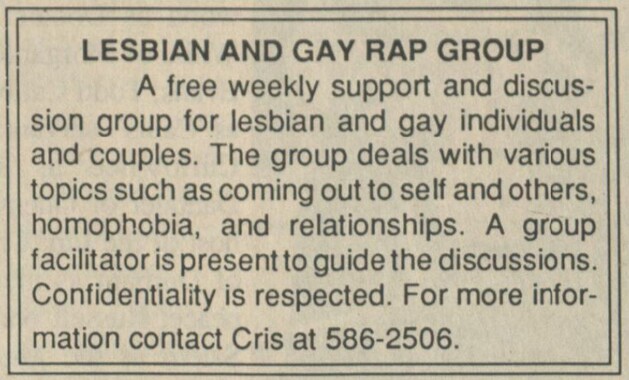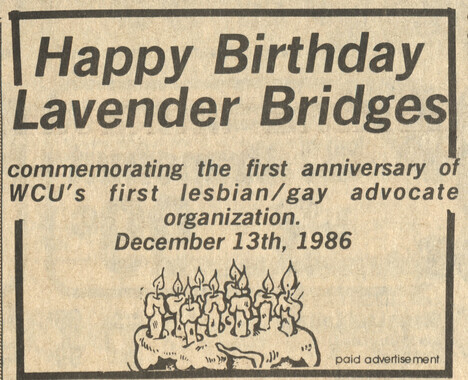Western Carolina University (20)
View all
- Canton Champion Fibre Company (2308)
- Cherokee Traditions (293)
- Civil War in Southern Appalachia (165)
- Craft Revival (1942)
- Great Smoky Mountains - A Park for America (2767)
- Highlights from Western Carolina University (430)
- Horace Kephart (941)
- Journeys Through Jackson (154)
- LGBTQIA+ Archive of Jackson County (19)
- Oral Histories of Western North Carolina (314)
- Picturing Appalachia (6679)
- Stories of Mountain Folk (413)
- Travel Western North Carolina (160)
- Western Carolina University Fine Art Museum Vitreograph Collection (129)
- Western Carolina University Herbarium (92)
- Western Carolina University: Making Memories (708)
- Western Carolina University Publications (2283)
- Western Carolina University Restricted Electronic Theses and Dissertations (146)
- Western North Carolina Regional Maps (71)
- World War II in Southern Appalachia (131)
University of North Carolina Asheville (6)
View all
- Allanstand Cottage Industries (62)
- Appalachian National Park Association (53)
- Bennett, Kelly, 1890-1974 (1295)
- Berry, Walter (76)
- Brasstown Carvers (40)
- Carver, George Washington, 1864?-1943 (26)
- Cathey, Joseph, 1803-1874 (1)
- Champion Fibre Company (233)
- Champion Paper and Fibre Company (297)
- Cherokee Indian Fair Association (16)
- Cherokee Language Program (22)
- Crowe, Amanda (40)
- Edmonston, Thomas Benton, 1842-1907 (7)
- Ensley, A. L. (Abraham Lincoln), 1865-1948 (275)
- Fromer, Irving Rhodes, 1913-1994 (70)
- George Butz (BFS 1907) (46)
- Goodrich, Frances Louisa (120)
- Grant, George Alexander, 1891-1964 (96)
- Heard, Marian Gladys (60)
- Kephart, Calvin, 1883-1969 (15)
- Kephart, Horace, 1862-1931 (313)
- Kephart, Laura, 1862-1954 (39)
- Laney, Gideon Thomas, 1889-1976 (439)
- Masa, George, 1881-1933 (61)
- McElhinney, William Julian, 1896-1953 (44)
- Niggli, Josephina, 1910-1983 (10)
- North Carolina Park Commission (105)
- Osborne, Kezia Stradley (9)
- Owens, Samuel Robert, 1918-1995 (11)
- Penland Weavers and Potters (36)
- Roberts, Vivienne (15)
- Roth, Albert, 1890-1974 (142)
- Schenck, Carl Alwin, 1868-1955 (1)
- Sherrill's Photography Studio (2565)
- Southern Highland Handicraft Guild (127)
- Southern Highlanders, Inc. (71)
- Stalcup, Jesse Bryson (46)
- Stearns, I. K. (213)
- Thompson, James Edward, 1880-1976 (226)
- United States. Indian Arts and Crafts Board (130)
- USFS (683)
- Vance, Zebulon Baird, 1830-1894 (1)
- Weaver, Zebulon, 1872-1948 (58)
- Western Carolina College (230)
- Western Carolina Teachers College (282)
- Western Carolina University (1794)
- Western Carolina University. Mountain Heritage Center (18)
- Whitman, Walt, 1819-1892 (10)
- Wilburn, Hiram Coleman, 1880-1967 (73)
- Williams, Isadora (3)
- Cain, Doreyl Ammons (0)
- Crittenden, Lorraine (0)
- Rhodes, Judy (0)
- Smith, Edward Clark (0)
- Appalachian Region, Southern (2393)
- Asheville (N.C.) (1886)
- Avery County (N.C.) (26)
- Blount County (Tenn.) (161)
- Buncombe County (N.C.) (1664)
- Cherokee County (N.C.) (283)
- Clay County (N.C.) (555)
- Graham County (N.C.) (233)
- Great Smoky Mountains National Park (N.C. and Tenn.) (478)
- Haywood County (N.C.) (3522)
- Henderson County (N.C.) (70)
- Jackson County (N.C.) (4692)
- Knox County (Tenn.) (25)
- Knoxville (Tenn.) (12)
- Lake Santeetlah (N.C.) (10)
- Macon County (N.C.) (420)
- Madison County (N.C.) (211)
- McDowell County (N.C.) (39)
- Mitchell County (N.C.) (132)
- Polk County (N.C.) (35)
- Qualla Boundary (981)
- Rutherford County (N.C.) (76)
- Swain County (N.C.) (2020)
- Transylvania County (N.C.) (247)
- Watauga County (N.C.) (12)
- Waynesville (N.C.) (68)
- Yancey County (N.C.) (72)
- Aerial Photographs (3)
- Aerial Views (60)
- Albums (books) (4)
- Articles (1)
- Artifacts (object Genre) (228)
- Biography (general Genre) (2)
- Cards (information Artifacts) (38)
- Clippings (information Artifacts) (191)
- Crafts (art Genres) (622)
- Depictions (visual Works) (21)
- Design Drawings (1)
- Drawings (visual Works) (184)
- Envelopes (73)
- Facsimiles (reproductions) (1)
- Fiction (general Genre) (4)
- Financial Records (12)
- Fliers (printed Matter) (67)
- Glass Plate Negatives (381)
- Guidebooks (2)
- Internegatives (10)
- Interviews (811)
- Land Surveys (102)
- Letters (correspondence) (1013)
- Manuscripts (documents) (619)
- Maps (documents) (159)
- Memorandums (25)
- Minutes (administrative Records) (59)
- Negatives (photographs) (5735)
- Newsletters (1285)
- Newspapers (2)
- Occupation Currency (1)
- Paintings (visual Works) (1)
- Pen And Ink Drawings (1)
- Periodicals (193)
- Personal Narratives (7)
- Photographs (12982)
- Plans (maps) (1)
- Poetry (5)
- Portraits (1657)
- Postcards (329)
- Programs (documents) (151)
- Publications (documents) (2237)
- Questionnaires (65)
- Scrapbooks (282)
- Sheet Music (1)
- Slides (photographs) (402)
- Sound Recordings (796)
- Specimens (92)
- Speeches (documents) (15)
- Tintypes (photographs) (8)
- Transcripts (322)
- Video Recordings (physical Artifacts) (23)
- Vitreographs (129)
- Text Messages (0)
- A.L. Ensley Collection (275)
- Appalachian Industrial School Records (7)
- Appalachian National Park Association Records (336)
- Axley-Meroney Collection (2)
- Bayard Wootten Photograph Collection (20)
- Bethel Rural Community Organization Collection (7)
- Blumer Collection (5)
- C.W. Slagle Collection (20)
- Canton Area Historical Museum (2110)
- Carlos C. Campbell Collection (282)
- Cataloochee History Project (65)
- Cherokee Studies Collection (4)
- Daisy Dame Photograph Album (5)
- Daniel Boone VI Collection (1)
- Doris Ulmann Photograph Collection (112)
- Elizabeth H. Lasley Collection (1)
- Elizabeth Woolworth Szold Fleharty Collection (4)
- Frank Fry Collection (95)
- George Masa Collection (173)
- Gideon Laney Collection (452)
- Hazel Scarborough Collection (2)
- Hiram C. Wilburn Papers (28)
- Historic Photographs Collection (236)
- Horace Kephart Collection (861)
- Humbard Collection (33)
- Hunter and Weaver Families Collection (1)
- I. D. Blumenthal Collection (4)
- Isadora Williams Collection (4)
- Jesse Bryson Stalcup Collection (47)
- Jim Thompson Collection (224)
- John B. Battle Collection (7)
- John C. Campbell Folk School Records (80)
- John Parris Collection (6)
- Judaculla Rock project (2)
- Kelly Bennett Collection (1314)
- Love Family Papers (11)
- Major Wiley Parris Civil War Letters (3)
- Map Collection (12)
- McFee-Misemer Civil War Letters (34)
- Mountain Heritage Center Collection (4)
- Norburn - Robertson - Thomson Families Collection (44)
- Pauline Hood Collection (7)
- Pre-Guild Collection (2)
- Qualla Arts and Crafts Mutual Collection (12)
- R.A. Romanes Collection (681)
- Rosser H. Taylor Collection (1)
- Samuel Robert Owens Collection (94)
- Sara Madison Collection (144)
- Sherrill Studio Photo Collection (2558)
- Smoky Mountains Hiking Club Collection (616)
- Stories of Mountain Folk - Radio Programs (374)
- The Reporter, Western Carolina University (510)
- Venoy and Elizabeth Reed Collection (16)
- WCU Gender and Sexuality Oral History Project (32)
- WCU Mountain Heritage Center Oral Histories (25)
- WCU Oral History Collection - Mountain People, Mountain Lives (71)
- WCU Students Newspapers Collection (1744)
- Western North Carolina Tomorrow Black Oral History Project (69)
- William Williams Stringfield Collection (2)
- Zebulon Weaver Collection (109)
- African Americans (388)
- Appalachian Trail (35)
- Artisans (521)
- Cherokee art (84)
- Cherokee artists -- North Carolina (10)
- Cherokee language (21)
- Cherokee pottery (101)
- Cherokee women (208)
- Church buildings (166)
- Civilian Conservation Corps (U.S.) (110)
- College student newspapers and periodicals (1830)
- Dams (95)
- Dance (1023)
- Education (222)
- Floods (60)
- Folk music (1015)
- Forced removal, 1813-1903 (2)
- Forest conservation (220)
- Forests and forestry (917)
- Gender nonconformity (4)
- Great Smoky Mountains National Park (N.C. and Tenn.) (154)
- Hunting (38)
- Landscape photography (10)
- Logging (103)
- Maps (84)
- Mines and mineral resources (8)
- North Carolina -- Maps (18)
- Paper industry (38)
- Postcards (255)
- Pottery (135)
- Railroad trains (69)
- Rural electrification -- North Carolina, Western (3)
- School integration -- Southern States (2)
- Segregation -- North Carolina, Western (5)
- Slavery (5)
- Sports (452)
- Storytelling (245)
- Waterfalls -- Great Smoky Mountains (N.C. and Tenn.) (66)
- Weaving -- Appalachian Region, Southern (280)
- Wood-carving -- Appalachian Region, Southern (328)
- World War, 1939-1945 (173)
Interview with Channing Taint
Item
Item’s are ‘child’ level descriptions to ‘parent’ objects, (e.g. one page of a whole book).
-
-
Taint 1 GENDER & SEXUALITY ORAL HISTORY PROJECT DRAG QUEENS Interviewee: Channing Taint Interviewer: Sarah Steiner Location: Asheville, NC Date: March 30, 2018 Duration: 39:21; 9 pages Sarah Steiner: Okay, my name is Sarah Steiner and I’m here with Sierra Jo Kimberlin whose drag name is Channing Taint and it is March 30, 2018 and we’re in Asheville, North Carolina. And we’re going to be discussing her experiences with drag performance in western North Carolina. So to start off, how old are you? Channing Taint: 22. SS: And how do you describe your gender. CT: I am female identifying, so like she her hers. SS: And how about your sexuality. CT: Lesbian. [laugh] SS: Where are you from and how long have you lived in western North Carolina? CT: I’m from Lenoir, North Carolina and then I moved, so that’s technically part of western North Carolina, moved to Asheville about 3 years ago. SS: And how often do you perform and where, you don’t need to give a whole laundry list, but just some [main] places. CT: I perform pretty much every month, probably about five to six times a month and then it’s mainly at the Odditorium and then LaZoom and Ole Shakey’s. And then every now and then we go weird places. SS: Sure. What type of drag would you say you do? CT: Probably gender fuck is probably the closest, so its drag king but more I try to keep it more, I don’t want it to be strictly into masculinity. When I started it I did it, I created my drag persona as redefining masculinity in ways. Most people describe it, and I’ve described it as gender fuck drag. Where it’s just kind of across the board, they place it in the spectrum. Not lies on one end. SS: And what is drag to you? CT: For me it’s an artistic outlet, ‘cause I’m not good at painting or drawing or anything like that so I like the performance art. But then drag to me is also kind of a way, it’s a big community, or queer activist way, you can look at it that way. I think in the past drag performers have been very much heads of a lot of movements throughout queer history even. They’ve been the people in the forefront doing shit. And being the voices and talking and making emotion around things. Even right now, with all the RuPaul stuff with him kind of getting ran through the mud over the trans comments1. Queens who are even backed by him are kind of throwing him in the mud and being like, nope you can’t say those things, that’s not Taint 2 okay. But I love it, for me it’s definitely a way for me to express my gender and sexuality in a different way other than just day to day performances. CT: And let’s talk a little bit more about the activism piece. How would you say you’ve integrated activism into…? CT: So, I’ve done two specific numbers that I know I’ve… I’ll do numbers where we donate all of the tips and money I made that night to a specific cause. Just incorporating social situations, social happenings into your drag is a way to make that activism. Because you do have an audience that’s watching it and you’re trying to bring up across a point and point out things, but I think it in itself is a form of activism. And it’s a political point because you’re literally dressing as the opposite gender or playing along the gender spectrum in front of people and that’s making a point in itself. So it’s like you’re making a statement regardless of what you’re doing. You’re kind of standing out there and putting a point on the stage. I don’t know if you ever got to see Chartreuse perform. SS: No. CT: She’s like, I would look her up, she’ll be here this summer so if you could catch her, she might be here this summer. If you can catch her this summer she’s an excellent person to talk to. She does dragtivism. That’s what she calls it. She’s a super big person that does activist drag where she’s… all of her numbers have a point and a statement to them. SS: Okay, awesome. What motivates you to perform? CT: It was kind of a coming out thing for me, when I came out I started doing drag so it was a way for me to learn about my sexuality and learn about gender and all that for myself, too. That motivated me a lot to explore in it and play with it and have fun with it. Because the drag community was what I came out in and then I had all these drag queens around me who were just like feeding me and “do it” and I was like, yay, gay is awesome, this is great. But then it, I just love it so much because it’s, I don’t know, I’ve always loved performance art, but I was always like, it’s weird because when I’m on the stage it’s a different thing than just me being on a stage because that horrifies me, I’m like uh-uh. But then when I’m in, once I’m in full drag it’s a totally different me. Just getting into that persona and trying to perfect that and make it what I want it to be every time, it’s just a motivating factor for me. Channing when I first started I was like “I don’t really know what I’m doing.” And every time I’ve tried to pull different parts of that persona out on the stage and just more fit into the weird nonsense that it is. [laugh] More blow up penises, that’s all I need. SS: So who in your opinion can do drag? CT: I think as long as you have a respect and understanding of what the drag community, what drag is in the history of drag and you’re not doing it in a making fun way, where like, you’re not making fun of the queer community. Cause if a straight person wants to do, like one of my drag children is a straight girl and she wanted to do drag and I was like, okay, if you want to do it I don’t understand why you shouldn’t be able to do it just because you’re not queer. But she wants to know, and wants to learn more and just has a genuine appreciation for it as an art form. So I’m like if you can appreciate it that way I don’t see why we should exclude people. I know there’s a lot of controversy around bio queens and bio kings, I haven’t heard a lot of that. The bio queen thing is a big thing. As long as I think you’re Taint 3 respecting the art form in itself and you’re not mocking it then I don’t see a point of excluding you. There’s no point, it’s art, you can’t tell people they can’t make art. SS: Have your thoughts on that changed over time? CT: Yeah, because I think at first when I was starting it and learning about drag I had a lot of queens and stuff talking in my ear. There are a lot of queens that really disapprove of bio queens, they do not think that should be a thing at all. And I get where they are coming from with it because they feel like it’s, especially with straight women doing it, being drag queens, they have an issue because they feel like they are taking something that is a very queer art form and a queer thing and trying to participate in it. But, I don’t think they are doing in a mean or a horrible way. I do know some people that do it and are kind of mocking or kind of a fad thing like it’s popular now so I want to do it. But I definitely they disagree… some of the queens definitely disagree with me on it and don’t think it should be a thing. That was more so where my opinion was but the more I learned and started participating in it myself, I don’t see the point of telling people no. I got the chance to do this and I didn’t really have a fucking clue what I was doing so. [laugh] SS: How did you choose your stage name and what’s its significance? CT: My stage name was a last-minute pick that we, I was so, Priscilla [Chambers] decided to put me in one of her numbers, but then we realized we didn’t have any way to introduce me besides my name, but I would be doing drag, I wasn’t going to be just a back-up dancer. And so we were last minute trying to look up funny puns, that weren’t already taken drag king names and then there was… so originally the one we saw was Channing Taintum, but I didn’t like the um part on it because I thought that just seems a little unnecessary. So we just cut it and then it’s just stayed that way. I don’t even know if there’s any significance to it, it’s just become a name that a lot of people have a weird significance to it, like my drag son’s is Trashton Cootcher, and their name is Ashley and everybody always calls her Trashley sometimes so she just played along with that and did the whole pun on Ashton Kutcher so. Some people’s have a purpose, mine is literally just like we made this up and it’s just kind of stayed that way. And it’s funny. SS: Can you remember the first time you were exposed to drag in film and maybe in person? CT: In film was The Birdcage I think when I watched that, I don’t remember how old I was. And then obviously I saw Rocky Horror Picture Show and stuff. The first time I saw an actual live drag performance was right after I moved up here and I was working, me and Pricilla were working at the same place, and she invited me to come to the show and so I went and that was the first time I ever saw it. And it was just so crazy and just entrancing and I was like this is amazing. It’s so much different than it is on TV. RuPaul’s drag race was always interesting too, but I was like... the performance, live performances are so much different. I love it. SS: Were you inspired right away to do it yourself, or did it take a little time? CT: I was interested, but I had longer hair at that point, so I was like, no, cause I’m not good with hair in general so I was like I don’t know how I’m going to make this work. But then once I cut it off I was like well I guess now is the time I could try it. And then Cody [Priscilla Chambers] really pushed me to do it. Cause I had mentioned to him that I was interested and then he was like, he got me in drag the first time and I was like, okay, this is fun and I kept doing it and I was getting more, found kind of a passion over the artform of it. So. Taint 4 SS: Is Cody… CT: Priscilla yeah. Prissy. I go back and forth. I just know him and lived with him for awhile so it’s like we’ll interchange his name back and forth. SS: Can you tell us more about your first time in drag? CT: Yeah, that was horrifying. I wasn’t 21 yet so I couldn’t drink and it was just like, I didn’t know what I was doing ‘cause I hadn’t ever seen any other drag kings really perform besides the ones that were at Scandals. And I didn’t really have anything to reference off of. I was like, I don’t know what I’m doing, besides what Pricilla was saying how she wanted us to interact with each other. I always repost the video when it comes on Facebook, so if you see that on Facebook definitely watch it. It’s the most awkward thing in the world, it was horrifying. There was no one at the bar that night either so that made it even worse because I don’t like performing in front of smaller crowds, I prefer more of a bigger crowd because they kind of feed off of each other. So no one was really clapping or yelling or anything. You could hear a pin drop basically if there was pause in the music. It was not the best one. The second time I was in drag is was a big night and I was one of Cody’s back up people essentially, but was actually doing the lip syncing and stuff. But that first one was rough. I was surprised I still did it. It was just fun being in the dressing room with the queens and stuff and helping me get ready and telling me oh you’re going to be fine, it’s going to be great. You’re going to do great. And I’m like, are you sure? I don’t know. [laugh] SS: How does your drag identity relate to your out of drag identity and how do they fit together for you? CT: I feel like, out of drag I’m still, I’m very feminine, but I still play with the gender lines and I don’t… I kind of like to be like, yes, cause people will be like are you female identifying? and I’m like, yeah. And I think that’s the thing with Channing too. I want to play along the redefining things because I’m defining femininity out of drag, what it is to me. And it may not look what everybody else thinks it looks like. And then in drag as Channing I’m redefining what masculinity can look like. I think that those in a way can play with each other. [to dog: But she’s being a... she’s a little attention whore right now, she gets all the attention]. Because when I read that question I had to think about it for a second. How do they like to interchange or not? But I think it’s more so with the gender thing. I still identify as female. Because Channing onstage I’ll do numbers where I don’t necessarily tape [breasts] back. And I’ll do it where I have pasties on. And I’ll just do it with pasties or wear skirts and stuff like that. No, I’m going to play with the gender line. I don’t always want it to look super masculine and hyper masculine ever either. SS: Sure. So, how do you think drag in western North Carolina is different from drag in other areas that you might be familiar with? CT: We have the pageant drag scene which is pretty large in the south. Which I thought was super interesting because I hadn’t really heard about it. I heard about pageant queens when I was watching RuPaul’s drag race, but I didn’t really know what they were talking about, I thought they just looked like the pageant girls and stuff, I didn’t know there were actual pageants. And that’s a very big and kind of holds you in a different status as a queen or king in the area. Because if you hold titles you have more, you’re looked at as more experienced or higher-qualified performer. Because the titles are very important to them. Winning them and holding those crowns is like a super… it’s a status symbol here. We’re also really small. The drag scene here is very up and coming, it’s not like a big, we haven’t really Taint 5 had time to grow. It’s always kind of been solely at Scandals for the most part over time. And then as, now Cody is doing his own stuff. There is still stuff at O’Henry’s now too. And then all these little places are wanting to have drag things at them. And so it’s growing and more people are doing it in the area too so it’s getting bigger which is exciting because when places like Atlanta and New York City and San Francisco and LA all their drag scenes have such diverse performers, whereas I think, we do have a diverse array of people and the types of performance styles they do, but I still think they are kind of… New York City has a club scene kid drag style that’s solely, there are just queens that just do Leigh Bowery masks for weeks, that’s just what they do. But we have the pageant girls is very dominant here. And so I think the more the scene grows the more diverse performers, and an array of performers and styles of performance we’ll get. Cause, there is a lot of wildness that can happen in drag. New York City’s drag scene is insane. It’s wild. It’s almost overwhelming just how much artistic stuff comes out from people. I’m like, whoa this is wild. I would have never thought of that, that is amazing. SS: Have you ever done a pageant? CT: Nope. I’ve been asked to do them, but... it’s more so the money aspect for me, because you do have to drop a lot of money for these pageants. SS: To enter, or for costumes or both. CT: Some of them it’s both. The entrance, you do have to pay an entrance fee for some of them. And sometimes its only $25 or so, but I’ve heard of pageants where it’s like $150 to enter them and then you are additionally paying for all of your costumes if you have to travel to them, because Scandals holds some, but they only hold… they are kind of themed around holidays almost. I just don’t, I can’t convince myself to drop that much money cause I will hear how much they have spend on dresses and makeup and all these things and rhinestones and just the time they put into it and all you win technically is not even close to half of what they spent on it. And I’m like, is it really worth it though. Cause that’s a lot of money that you just dropped on this to just win the crown and then get $200. It’s a lot of money. Just for me. And I don’t really, that style of drag doesn’t appeal to me. It’s very structured that you have to fit into the box of what they want you to do. Talents have to… the talent portion cannot just be you performing, it has to have a structure of you’re doing a story and you’re telling a story, it has a concept. I like that type of performances too, but sometimes it’s fun to just dance around and be silly. SS: Since you’ve been here in Asheville, what changes have you seen in terms of receptiveness to drag in the LGBT community, if any? CT: I’ve definitely seen more acceptance to different types of drag. Because when I was first here there was a lot of kind of backlash against… Priscilla is a very weird queen, she’s was kind of one of the very non-pageant drag queens that was in the area besides like Abhora too. And the receptiveness to them was like, the people watching liked it, but then other queens really didn’t like it. But not everybody also really liked even his style either because they were so used to having the pretty girl in the ball gown and the big hair, standing doing power ballads or something. Or the ones that buck the house down and dance the whole time doing high kicks and splits repeatedly. But it’s changed a lot and even at Scandals there’s a lot more variety in the performances. I think, I do think a lot of even just the receptiveness just in general in the entire population, even here has come out of the popularity of RuPaul’s Drag Race. It has kind of hit the fan and everyone is in love with it now. It’s popular so. There is a lot of people interested in it and more so than they were before since that has blown up. [laugh] Taint 6 SS: What about receptiveness to drag kings specifically? CT: There are still not a lot of people that like kings. A lot of people didn’t even know that was a thing. I didn’t really know that was a thing that much really either until Cody said something to me about it and I was like, what, oh that’s weird. Cause you only ever see the queens. Even coworkers of mine that religiously watch Drag Race and stuff will be like… I’ll be like, “Oh I do drag” and they are like “Oh you just dress up like a girl?” And I’m like “No, I dress up like a boy, like drag kings” and they are like, “Wait, that’s a thing?” Yeah, it’s actually pretty common, it’s not as uncommon as people like to think. It’s like, I think it’s different because there’s not the whole queen element. They do... it’s more impressive when you watch a dude in heels do high kicks and splits than it is if even as a girl I’m doing it as a king. There’s a wow factor to that. They are like, oh my god. If I do it, they are just kind of like, yay, good for you. But when they do it it’s like this “Aww” thing people are like, oh my god. And watching them come out even in stilettos you are just like “how the fuck.” I see some of the things they wear and I would die. I would break my ankles and then to do splits and high kicks on those: definitely would die. So I think that’s just the wow factor that they get from that and it’s trying as a king you have to play off of other elements because, I don’t know, apparently people are just not as interested in that factor of things. It’s very weird to me because I know in other cities there is a really big receptiveness to kings and they have a lot more. But I still think it’s more so from other queer people, it’s other queer members that are very intrigued by it, less than non-queer identifying people. They are just like, “ehh that’s okay, not super intrigued by it,” but also, I’m like “that’s cool that you do that.” They say we’re boring. I’m like, okay, that’s fine. I don’t think we’re boring, but I think it’s just a different artform in itself and… I don’t know. Masculinity isn’t impressive? I don’t know. It’s strange. The receptiveness can vary. Either people really like me sometimes or people could absolutely give a shit. That’s why I try to do a lot of different things I don’t rely sheerly on straight going for the hitter norm at masculinity aspect being like, I’m going to be as macho as possible. No, I’m going to do, I want it to be more of an artform to me and a way of expression than that. Which people tell me that’s why they like mine. I still feel like I have to work on it. SS: So what makes you happy day-to-day as a member of the drag community? CT: It’s very entertaining. [laugh] There’s always something going on like, and it’s just fun to bounce back on each, bounce back with each other on different ways of performing. You’re all doing it and we’re all queer and we’re trying to perfect it and it’s kind of like a sense of family too. We do have our drag family so you have this queer group of people that are like they were just friends, but now it’s way more than that. They are people that you can literally rely on and go to day-to-day, talk to about things, they are just as receptive to everything. You have a support system so it feels nice. In the queer community sometimes it’s really difficult. People still—queers—can be really mean to and hateful to each other. So having a group of people that you can kind of look at and thy have a support for the art in itself and you all have a common ground on something is pretty cool. I like it a lot. SS: Do you think it would be different if you lived somewhere else? CT: Maybe. I know that drag families are, it’s a very tightknit thing. If you are a part of a drag family it becomes, they are literally your family. They will be there for you for anything. If you need help, if you need somewhere to stay, you’re going through things, they are… I know in big cities, in Paris is Burning they talk a lot about the drag family culture, it’s very tight-knit. Some people even live, they all live in the same house. They will go in and buy a house with each other and it’s this little drag… little hut where it’s drag all the time, and they live like a family. There are the Glamoure-Scotts in the area, they all live in Taint 7 the same house, have family dinners and stuff. It’s a very family set thing. Whereas ours is very, we’re still all there for each other and we will all hang out, but we all are super busy with everything else that it is hard for us to kind of just be like [inaudible]. In bigger cities the drag family culture is very, very big and very tight-knit. Even in Charlotte there is a drag family that Cody is part of. They are a drag house. And they spend, almost every almost waking hour with each other and I’m like, do you guys get tired of each other? SS: What struggles do you encounter as a member of the drag community? CT: I guess mine would probably be around being a king. Solely, I was talking to her about this early today too, there is a power dynamic of, I’m still a female out of drag and they are males and they can be very masculine and assertive in situations and I’m like, it’s still that same power dynamic. I am a female they are males and they will talk over and they have the higher grounds, they do have a power over me in a sense. I am lower on the food chain than they are. Even just receptiveness from audience people. How often and frequently I’ll even get booked. There are some places in town that don’t like kings at all so they haven’t even seen me perform, but they know past kings that they’ve had and they don’t like it so they don’t book any. Even regardless if my style is different than what they’ve seen before they just don’t, they are like nope. So that sucks. It’s also interesting because I’m, of most of the kings, popular kings in Asheville, and there are a lot more kings up and coming right now. I’m the only female identifying out of drag, most of them are trans men. So when I was starting I didn’t really have a lot of people that I could... like with makeup I’m like “what do I do” and they are like we don’t really do a lot so. Okay, so I was taught by drag queens so my makeup and that’s probably where my persona gets more crazy is because I was raised by a bunch of queens that taught me. Basically put me in drag and taught me how to do it. But it’s definitely the gender dynamic is very interesting because I still struggle with it with some of them sometimes. My opinions and things do get disregarded and I will get talked over in situations. And I pointed out to them, because there was a time where my drag was being very much policed and I was told I wasn’t, I needed to stop doing girl songs and I needed to stop doing the gender fluid things and I needed to be a little bit more masculine and I was like, is anybody else getting told? Are you telling any other queens how they need to do their things because it doesn’t seem like it. I’m not hearing any back lash on their performances. But you also do male songs as a queen so you telling me that I can’t perform female songs is very hypocritical when you do the same thing too. It’s just the same thing, but roles reversed. And I don’t know, it’s very interesting. I’m like oh it’s all these queens and then I’m the one that is still the out of drag thing, out of drag I’m still a female and they are males. And they will hold that, but we’ve worked on it. I’ve pushed a lot and fought back really hard against that happening and that power structure kind of staying there because I’m like, nope, I still have just as much of a say on things and I think my drag is valid in a sense and I’m trying to do a lot to change people’s views on king. And to tell me how to do my drag or that I can’t do specific types of drag is messed up. Cause I think it’s wrong to tell someone how they should… it’s their artform. Critiquing is different than being like, no, stop. So, that’s probably the only thing I would want to change and really have struggled with since being in the drag community. SS: Do you get called “she” frequently when you’re on stage or coming out on stage and do you have any feelings about that? CT: It’s happened a few times, it was weird. I was like what? It doesn’t bother me as much since I do the gender fuck drag so I do play along the spectrum, so I’m like, ehh. But I do know there are queens… if Taint 8 I’m in drag I do prefer people to call me by my drag name I don’t… cause there will be people that don’t necessarily know me and I don’t want people, when I’m at a performance… cause we’ve had some really creepy stalker almost obsessive people over performers that went a little crazy and started getting too into people’s business. It’s kind of out of protection, you don’t want them finding out about your personal life, so them calling you by your drag name kind of sets that barrier between you and them. Most people don’t know what Ginger’s real name is and it’s like there’s a reason why some of us keep it that way. We don’t want people to know that part of us. You are still a spectator and this is a different part of our lives. We let people know our personal lives when… I know Ginger’s real name and I’ve known it for awhile, but I never call her by it. It’s like, when you said it earlier, I was like, what? Oh, Ginger that’s who you’re talking about. But I always forget it. I don’t have an issue with it. SS: How has your drag life changed over time? CT: Um, I’m definitely more comfortable in it now. I had a really long break when I first started because I wanted to perform at Scandals but then they didn’t like what I did and they wanted me to be more masculine, but I was like that’s not what I want to do with this. So then I had almost a year break of not doing it at all. So that kind of sucked, but it did give me a lot of time to sit and think about what I wanted to do and practice my makeup. So it, now I’m just a lot more confident and I feel more competent in asserting myself in situations. Because I did let myself almost bullied around and told oh you can’t do this, you can’t do this, you need to do this instead of that. And I’ve been like, nope, this is what I want to do and this is why I started doing it and I’m not going to let you push me into a box. So I’ve definitely grown a lot more confident in my drag. And in even just trying different things with it because… my stage presence is a lot better too. When I look back at that video, I’m like, I look scared, I look like I don’t want to be there at all, I look horrified. But now it’s just like second nature. As soon as I’m in it. I’m immediately into that head space and I’m like alright we’re going to do this let’s go. But yeah, I think it’s just like I’ve had a confidence boost over the years in all aspects of it. Because I’ve felt more comfortable in who Channing is and also who I am too. So building both of those kind of build with each other too. It’s so much fun. SS: Did you ever feel like quitting? CT: Sometimes when I was, at first when that was happening it was just getting too much. I was like, I want to do these things, this is my thing and I’m like, why are you going to sit and tell me not to do that. And I was stressed to the point where I thought about it, but then I was like, I shouldn’t let that--I moreso let it motivate me instead of let it take me down at one point is kind of how I started looking at it, of being, nope I’m going to prove wrong to you... prove to you that people actually enjoy what I’m doing and it’s okay for me to be a drag king like this. And people are coming and enjoy it and adamantly will come and tell me how much they appreciate what I’ve done and they like it and they’ve came back because of it too. And I was like, see, me doing this has a fan base around it. And I’m going to stick with that and I’m going to keep doing it and that’s what I’ve made myself after doing it. There was a point in time where I was very close to quitting, but I powered through it. [laugh] SS: So, do you find yourself using different language with other performers than you do with people at work or people in your family? CT: Yeah, there is a lot of weird drag, like drag family stuff. That’s always an awkward one when you talk to your friends, they are like, what? Me and Priscilla are drag husband and drag wife and it’s like, my Taint 9 drag wife, and they are like what? And I’m like, they are just my friend, just kidding, I’m not going to use that term. Some people if they want to talk about it or they know us or have seen us they will ask what it means and I’ll explain it, but the drag family thing is definitely something I leave out a lot of times when I’m talking to people who aren’t familiar with that or my coworkers because they are just like what they hell are you talking about. It’s just weird to them, they don’t quite get it, they are like that’s strange and then there is all the weird RuPaul lingo things that people use. The sashay, shauntay, the types of dancing, bucking is one that when they talk about girls who dance a lot. It’s kind of just that type of lingo, but I think the biggest one is the family stuff and I’ve watched us, even other people adamantly not use that verbiage when they talk to coworkers. The faces you get sometimes are like what the hell is happening, you all are playing an alternate reality literally. It’s not just like you are doing this dress up thing, now you are creating families off of it too, okay. That’s strange. When I was doing my research I was very interested by it and how deeply, it goes back in the drag. People trace their family histories of being like, this queen from this time was the best in that place that was my great great great great…. And I’m like what? Geezus. Or it’s just like houses that were started by really famous old queens and then have continued. And if you’re a part of that house you have a status in the community and people... if you’re like oh I’m part of this family. Ida [Carolina] is part of Eureka O’Hara’s family so she has a status symbol on that now because there are people that don’t even know her but that just looked her up because she’s Eureka O’Hara’s daughter, that builds that way and you grow these families that extend off of one queen that is a big powerhouse and that holds you. They take that very seriously. It’s very interesting. I wanted to look more into it, but that wasn’t what I was focusing on because I did gender and performance, and I was like, dangit, I should of done this, but I didn’t know about it. SS: Genealogy of… CT: Yeah, I just want to trace back some of these queens and post a bunch of them. These are the drag family trees. Trace your history, let’s see where we can go. SS: Is there anything else you would like to share that I haven’t asked you about? CT: Let me think…. Not that I can think of right now. If I think of something. If you want to read my paper I can always just send it to you. It’s a long bunch of nonsense. The ethnography… because it was my anthropology degree and I did the ethnography on it so there is a lot of dialogue things and situations that I used to... it was a year and a half of me just spending time with them all of the time. And talking with them and the transcribing it was the worst because I procrastinated so much on it and then I was like, I have so much stuff that I have to write out now that… this sucks! But it was fun. SS: Thank you so much. CT: Of course. 1. Transgender Women on ‘Drag Race’? RuPaul’s Remarks Spawn Backlash. NBC News, John Paul Brammer, March 6, 2018. https://www.nbcnews.com/feature/nbc-out/transgender-women-drag-race-rupaul-s-remarks-spawn-backlash-n854066
Object
Object’s are ‘parent’ level descriptions to ‘children’ items, (e.g. a book with pages).
-
Sierra Jo Kimberlin, stage name Channing Taint, is interviewed by Sarah Steiner as a part of the Gender and Sexuality Oral History project. Taint identifies as a female lesbian and uses drag as an artistic outlet, performing gender fuck drag and as a drag king at The Odditorium, LaZOOM Room, and Ole Shakey’s. She shares her thoughts on drag activism and how her feelings on who can do drag have changed over time. She recalls her first time in drag, discusses drag in western North Carolina, explores how the drag community has changed in Asheville, explains the struggles of being a drag king, and considers the role of drag families.
-
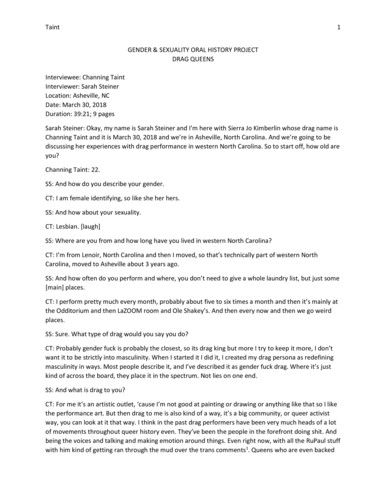


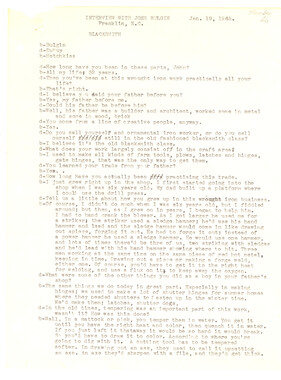




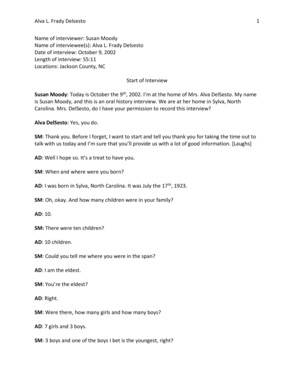
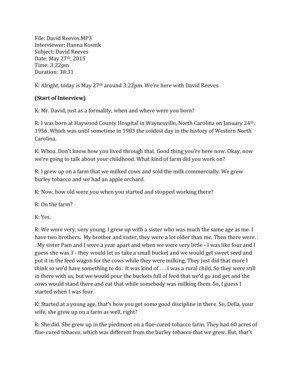
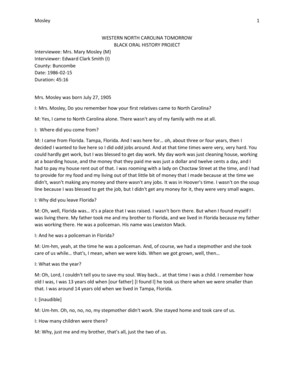


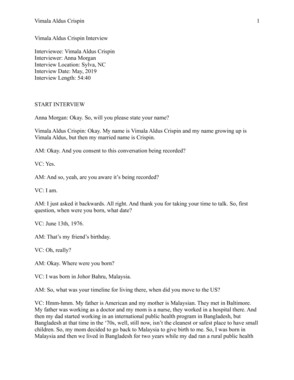




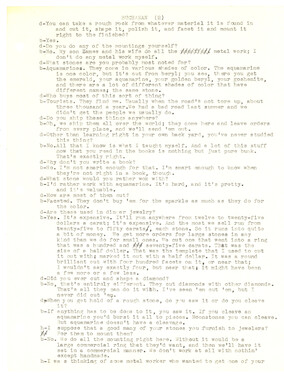
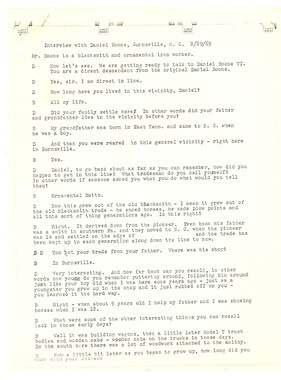

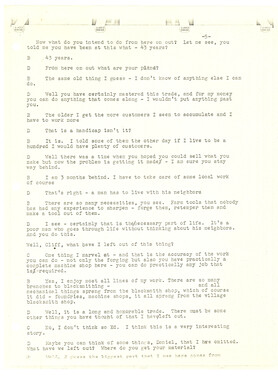



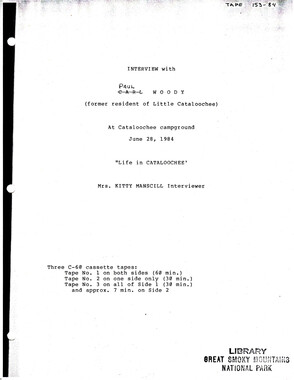








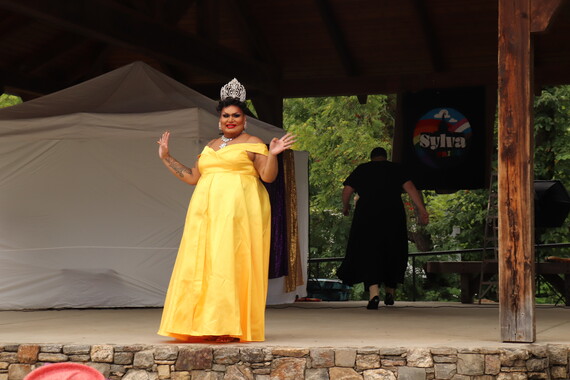
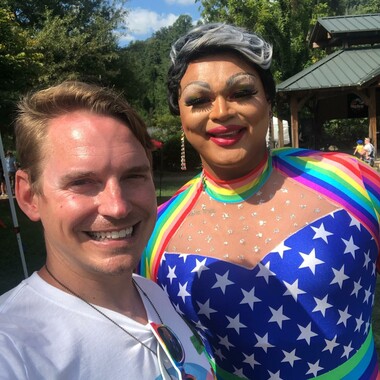


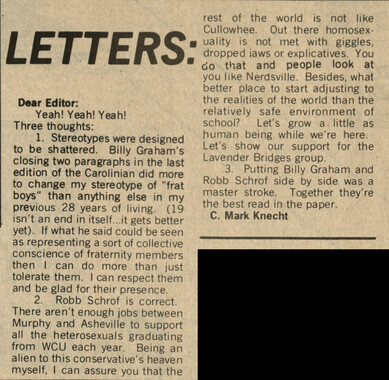

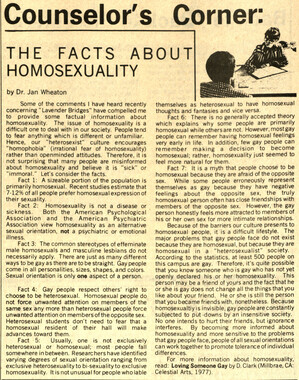

.jpg)
